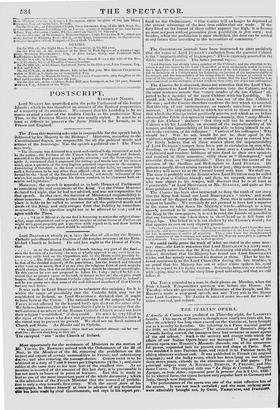The Government journals have been instructed to state positively that
the cause of Lord DinniAses exclusion from the amended Cabinet is the " impracticability of his,temper." This is expressly asserted in the Globe and the Courier. The latter journal says-
" Lonl Durham has already been a member of the Cabinet ; and the objection to his return is Out one urged by the laird Chancellor, as most erroneously stated in yester- day's Spectator—it is the objection of every mem& r sf hue late Cabinet—that they mill not be members of a Cabinet with his Lordship, oh account of the impracticability of his temper, and the impossibility of his being able to bring himself to submit to the control of his colleagues. We repeat. in express terms. that the Lon' Chancellor is no more concerned in the exclusion of Lord Durham than every one of his late colleagues."
The Courier, be it observed, denies our assertion that the Lord Chan. cellos objected to Lord DURHAM'S admission into the Cabinet, and in the same sentence asserts that "every member of the late Cabinet " ob- jected to be a member of the same Cabinet with his Lordship. We would ask whether Lord BROUGHAM VMS not of the late Cabinet? He was ; and the Courier therefore confirms the fact which we asserted. But this slip of our contemporary, as regards ourselves, is of little moment. The important fact to which we wish to direct attention is that which the Courier twice positively asserts, and which as we before observed the Globe also agrees in stating--namely, that "every Member of the lute Cabinet" declares " that they will not be members of a Cabinet with his Lordship, on account of the impracticability of his temper, and the impossibility of his being able to Ming himself to sub- mit to the CONTROL of his colleagues." Control of his colleagues ! Why should lie? Was he not, would be not be, their equal in the Cabinet—equally competent to control them as they to control bins ? We firmly believe that all these stories about the impracticability of Lord DURHAM'S temper have been put in circulation by men who, dreading, as the Times observes, " to meet over a Council-table the enlightened and resolute boldness of men fixed in their own opinions and resolved in their measures, vilify them as "ill-tempered," and proscribe them as "impracticable." Ilere we have the secret of the aversion of the Shuffiers and Red-tapia-ts to Lord DURHAM. He pursues a manly, direct course towards his oh ject ; they move tortuously. But they will never sit at the Council-board with him. We shall see. The time is probably not far distant when Lord DuariAto may be called upon to form a Cabinet himself; and then, we suspect, many of those who now object to his temper, will discover that he is at least as "practicable" as Lord BROUGHAM or Mr. STANLEY, and quite as free from petulant e as Earl GREY.
The Courier has been also instructed to deny the truth of our story that the King bad found out Lord BitouonAm's " tricks," and made no secret of his disgust at the discovery. Now, this is rather a delicate Subject to handle. We certainly do not pretend to have had a reporter in the room to take down his Majesty's words—although as a long speech, asserted to be correct verbatim, has lately been attributed to the King in the newspapers; it is not beyond the bounds of possibility that our historiette was taken down in short-hand as it fell from the Royal lips. Our belief in it is not shaken by the Courier's denial; for that appears to rest on very slippery ground.
" The fact (says t he Courier) that the Kiog never received the Lord Chancellor more gralonsly, awl never expressed inure unbounded confidenee in his LoriLliiii Ilian since the late resignations, is matter of notoriety. Those who know the straightforward nornly character of the Sovereign will admit that his Majesty never fails tu express his real sediments. ihiete is no Iinesiiig in that quarter."
We could easily prove the truth of what we stated in the same man- ner: thus—the bet is notorious that Lord BROUGHAM is a tricky man; it is equally notorious that the King is discerning and plain-spoken ; it follows therefore that his Majesty has timid out Lord 1.3a0uoliAat's tricks, and has openly expressed his disgust at them. That he has be- haved courteously to the Lord Chancellor during the late troubles, is no proof that his Majesty has not at other times spoken his mind freely in regard to his zigzag courses. Seriously, however, we conclude with saying, that we had the story from good authority, and that we still beliece it.






















 Previous page
Previous page